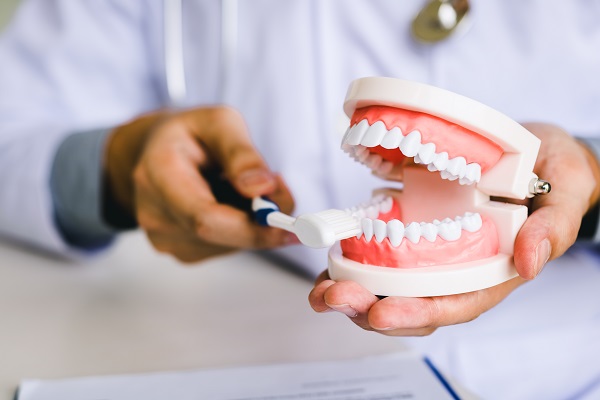Steps to Prevent Gum Disease

When it comes to the health of your mouth, you want to prevent gum disease. It does not matter how white or straight your smile is if your gums are not healthy. Even if you do not have cavities, it does not mean that you will not get gum disease. The problem is that gum disease is usually painless in the beginning stages. That means you might not notice you even have it at first. Keep reading to learn more about this condition.
What is gum disease?
This condition happens when bacteria-containing plaque begins to build up beneath the gumline. This sticky substance can easily infect the gum, negatively impacting the bone. This can cause tooth decay. Plaque will cause gingivitis, which is the earliest sign of gum disease.
The condition is reversible, but it can cause the gums to be inflamed or even bleed. Flossing or brushing can cause tenderness or bleeding. The good news is that this stage does not impact the supports of the teeth. However, without treatment, it can develop into periodontitis, which is advanced gum disease.
Getting regular dentist visits
A dentist can look for early signs of gum disease. This allows the dentist to treat the symptoms early on before becoming more serious. Getting a professional cleaning allows the dentist to take care of tartar. Cleanings also help remove plaque. The patient may not be able to get everything off with home care. Regular dental cleanings are part of reversing the earliest stages of gum disease.
Avoid smoking
There are many reasons for patients to avoid smoking. Gum disease is one of them because many studies have linked smoking with gum disease. It can weaken the immune system, which means the body will be less able to fight off an infection. If the gums have already been damaged, then smoking prevents them from healing properly. It has been found that periodontitis can progress faster in people who smoke than those who do not. Smokers often do not have a good outlook when it comes to gum disease.
Choose an electric toothbrush
Manual brushing can be hard to get right. Using an electric toothbrush may work better for some patients. It should be replaced every three to four months. Replacing the toothbrush can prevent damage to the gums.
Choose a therapeutic mouthwash
Patients can usually find this type of mouthwash over the counter. This can help reduce gingivitis and plaque. It can also slow down the development of tartar. Another benefit is that the mouthwash can remove food debris from the mouth. This is not a substitute for flossing and brushing, but an extra step.
Stop gum disease in its tracks
Gum disease can cause you to lose your teeth. However, if you follow the right steps, you are likely to be able to prevent it. Avoiding smoking and having good oral hygiene are two ways that you can stop this condition. If you feel that you have gingivitis, it is a good idea to make a dental appointment.
Request an appointment here: https://riverfallsfamilydental.com or call River Falls Family Dental at (812) 962-7342 for an appointment in our New Albany office.
Check out what others are saying about our services on Yelp: Read our Yelp reviews.
Related Posts
Incorporating good habits into routine dental care on a daily basis can help teeth and gums stay as healthy as possible. Regular dental hygiene is associated with reduced plaque, fewer cavities, and less incidence of gum disease over a person's lifetime. Patients do not need to completely overhaul their oral health routines. Instead, implementing a…
A routine dental care plan refers to oral hygiene that a patient performs at home as well as preventative care performed by a dentist on a periodic basis. When a patient has gum disease, the need for dental care is even greater. Some specific requirements may change, and the patient may have treatments that were…
General dentists often serve as the primary dental provider to patients of all ages. These dentists offer a wide range of preventive and restorative services, from dental cleanings to fillings and more. Whether preventing common problems or providing advanced restorative procedures, the goal remains the same — supporting healthy teeth, gums, and smiles at every…
Many people today think professional teeth cleaning is optional and its purpose is primarily to keep the smile bright. In fact, it should be part of routine dental care. Getting a cleaning from a dental professional is important for both the appearance and health of the entire mouth.Even those who brush and floss twice daily…
